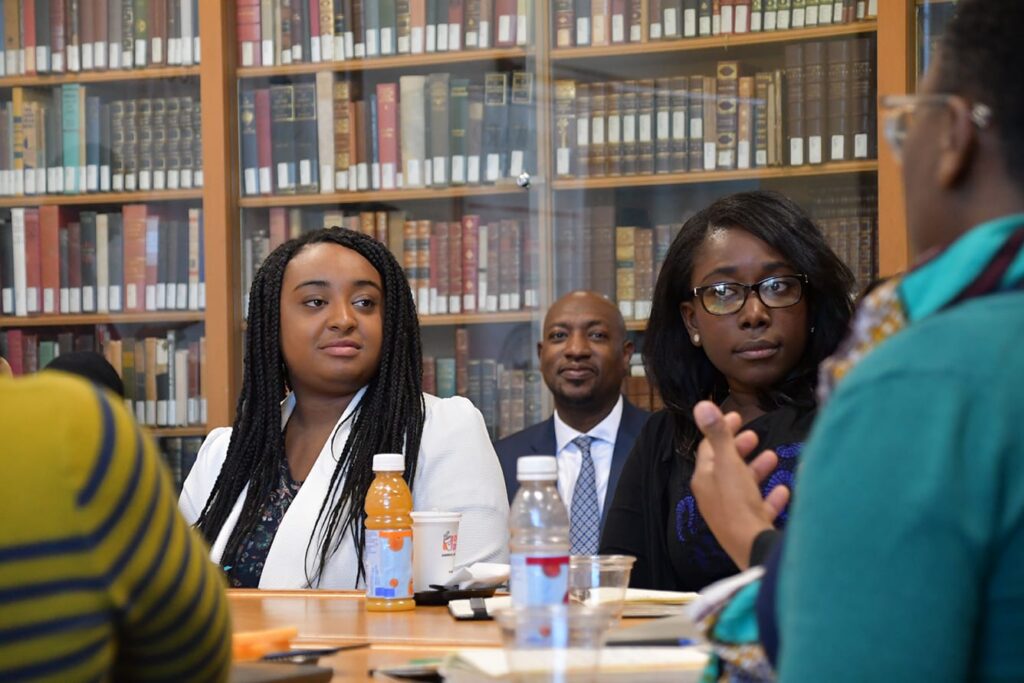Black Student Groups Face Fallout From SB 17 in Texas
How a new state ban on DEI initiatives at public colleges is impacting student organizations.

“I just want to be a student again,” said Maurice Cruz, former president of the Black Student Union at a university in north Texas, who has spent many nights worrying about how Texas Senate Bill 17 (SB 17), which prohibits diversity, equity, and inclusion offices and initiatives at state colleges and universities, might affect his student group.
He was right to worry. While SB 17 isn’t aimed at student groups, per se — and, supposedly, exempts student organizations that are registered or recognized by an institution of higher education — it’s undermining support for many of them. Since the law went into effect on January 1, 2024, many offices, programs, and positions that directly supported student groups have been cut. Black student unions are vulnerable because they rely on university staff and funding, typically through DEI offices, to grow and maintain their clubs.
With that in mind, I spoke with four student leaders about how SB 17 is impacting their organizations. They noted that the ambiguity of SB 17 means that the impact varies by university — with some universities searching for methods to support student groups in every way they legally can and others over-complying out of fear of violating the new law. Some student leaders said it’s already having a chilling effect on their student organizations, which exist to provide support and a sense of belonging for under-represented students who’ve historically been excluded from college campuses.
Aaliyah Barlow, former president of the Black Student Alliance at the University of Texas at Austin, whose mission is to create “a place of community for Black students to come together to talk about our experiences and work through them together,” told me that the “funding we used to receive from DEI offices that are now closed is completely gone, and funding from other non-DEI departments has been reduced as well.” That’s affecting the group’s programming and limiting members’ ability to attend student conferences, she said.
Maurice Cruz, of the Black Student Union at the University of North Texas, which exists to “promote Black joy and excellence while promoting activism in the community,” said that although they were able to get some funding for their staple events, they underwent “brutal and intense questioning from university staff that brought some student leaders to tears.” These challenges delayed events, and when student leaders tried to meet with university leaders to get clarification on how their groups would be affected, they got no clear response. When Maurice finally met with university leaders, he was told that his group wouldn’t be affected; but upon returning from winter break, he was shocked to find that faculty advisers had been moved around and funding was restricted.
Other student leaders, like Joshua Martin, former president of a Black Student Union at another university in the state, praised administrators and faculty members for doing all they can under the circumstances. “Although the law did affect us in ways, the staff and faculty on campus still did everything they could to support us while following the law,” he said.
Brianna Scott, a current Black Student Association president, said administrators at her university asked for input before enacting some of the mandatory changes: “When the Black Cultural Center had to get renamed, they invited students into the conversation about what the new name should be.” This showed Brianna and members of her student organization that the university wants to support them, for which she is thankful. “I know some campuses have been through a lot, and every campus is different. We are grateful that our administration is trying to help us.”
Each student leader I spoke to remains committed to promoting diversity, equity, and inclusion in higher education — which grew out of the civil rights movement and efforts to eliminate discrimination in education and the workplace and is essential to fostering a campus culture where all students feel supported. When asked what policymakers should do, Joshua said, “If policymakers began listening to student[s], they might feel differently about DEI.” He noted that DEI has become a politicized term that’s widely misunderstood, but it’s really about embracing differences, providing resources, and creating safe spaces for under-represented students who are navigating the challenges of being a college student. Maurice seconded the importance of uplifting these students’ voices before implementing changes, noting that, “We are OK with change, we just want to be a part of it.”
As universities figure out how to comply with SB 17 and protect student groups, it’s crucial that these goals are not viewed as mutually exclusive. Although the current political climate is fraught and often fueled by fear, power, and lawsuits, it’s the responsibility of institutions to ensure that students and student groups can continue to flourish under SB 17.
That said, the lack of clarity in SB 17 is placing an undue burden on those whom our leaders claim to protect: students. Policymakers must clarify the rights to which student organizations are entitled under SB 17. The student leaders I talked with said they also hope policymakers, advocates, and institutions will consider the needs of all students and how anti-DEI laws are impacting students of color, who just want to feel safe and welcome on their campuses and are now collateral damage in the latest political culture war. Imagine a group of 10 students is meeting in a room for their club. Ask yourself, what’s the harm in that?
Kaci Wright is pursuing a master’s degree in education policy analysis at the University of Texas at Austin. She is a former public-school teacher and a former intern with EdTrust in Texas.